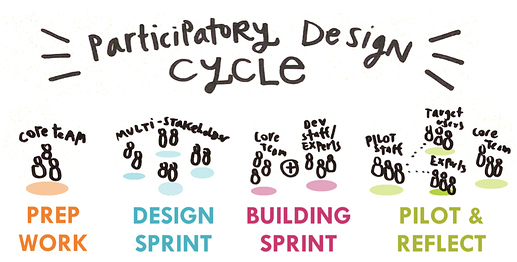Hi community,
This is my first post on Agora. I wanted to share with you some insights on the design process for the NFT standard on Tezos. The exciting part for me is that it goes beyond developing a standard definition of a ERC-721 alike, but will soon find its first (production) application in the Satoshi’s Treasure Hunt on Tezos! Before jumping into the matter, a brief intro to the team.
My name is István Deák and I work together with Matej Šima at Stove Labs. We are a young team in this setup, but already bring experiences from other blockchain technologies & ecosystems to the table. Have you used Granary? Then you know us from there, if not, visit for a compact overview on Stove Labs this blog article.
The purpose of this post is not to deep dive into various academic design frameworks, yet we should know what characterizes Participatory Design (PD). In short, future users participate in the design process as co-designers. Simply put, let application developers take part in the design process of the standard. While there is not much room to deviate from the dominant design within the Non-Fungible Asset ecosystem (ERC-721), we want to stay inclusive for new ideas.
Participatory Design Cycle Plan adapted from Margaret Hagan
Prep-work - core team
We have analyzed competitors (other blockchains), forerunners (dominant designs) and collected various approaches.
Design sprint - multi-stakeholder
It is a balancing act to provide a universal standard for various applications, but also keeping in mind the first use-case that will go into production (Satohi’s Hunt). The latter helped in prioritizing concepts and needs. We have gathered those through interaction with Satoshi’s Hunt team.
We have also personally interviewed an expert in the field of NFTs. His team has issued more than 100k NFTs on Ethereum, occupying 20% of the network for 1 week. I will discuss some of those insights in my talk at TQuorum Global Summit in NYC (Sept 30th).
Building sprint - core team - dev staff/ experts
An opportunity came up, when we got invited to mentor the first Eastern European Hackathon in Ukraine. Experienced developers mixed with a dedicated NFT track - the perfect testbed to put the standard to use. In preparation of the event we have published a dedicated website with documentation and code examples and even developed a ready-to-use SDK to help rapid development and experimentation. For some of the use-cases it was necessary to plan out a different implementation of the standard. This testing with stakeholders was a great experience, because we could also observe how developers use the software.
To summarize, the hackathon was a great success and you can read the recap in this post.
Pilot & Reflect - Core team/ experts target devs
We are currently at this stage to review the feedback we have gathered (and turning them into action) and the submissions in detail. Submissions? Those are the two teams that have received a special price from Stove Labs for using the NFT standard. 500 USD each - congratulations again to NFT Tickets and Blaize.
Future outlook
Until now there was a lot of direct involvement of users and stakeholders. We understand that teams are distributed especially in the blockchain community. We will include many stakeholders in the next iteration of the design. Consider how many people have to come together to have a correct asset representation in their wallet 
We wish for more interaction through the dedicated website nft.stove-labs.com and the respective repository. By the way, writing this post on Agora is an important step to introduce ourselves and our work to the community and even spark someone’s interest for collaboration.
Where can you get in touch?
If you’d like to keep track of our work and progress then please follow our Twitter account or join our Telegram chat.
If you’d like to meet us in person, the best opportunity would be the TQuorum Global Summit, where István & Matej will participate with technical demos about the NFT Standard and LIGO - the smart contract programming language.
